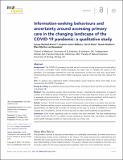Files in this item
Information seeking behaviours and uncertainty around accessing primary care in the changing landscape of the COVID-19 pandemic : a qualitative study
Item metadata
| dc.contributor.author | Brown, Lynsey Rachael | |
| dc.contributor.author | Williams, Andrew James | |
| dc.contributor.author | Shaw, Kevin | |
| dc.contributor.author | Ozakinci, Gozde | |
| dc.contributor.author | van Beusekom, Mara Myrthe | |
| dc.date.accessioned | 2022-02-16T10:30:03Z | |
| dc.date.available | 2022-02-16T10:30:03Z | |
| dc.date.issued | 2022-03 | |
| dc.identifier | 277027705 | |
| dc.identifier | b422ecf0-d98b-48bc-87e0-b583947ad4c6 | |
| dc.identifier | 85128851634 | |
| dc.identifier.citation | Brown , L R , Williams , A J , Shaw , K , Ozakinci , G & van Beusekom , M M 2022 , ' Information seeking behaviours and uncertainty around accessing primary care in the changing landscape of the COVID-19 pandemic : a qualitative study ' , BJGP Open , vol. 6 , no. 1 , 0151 . https://doi.org/10.3399/BJGPO.2021.0151 | en |
| dc.identifier.issn | 2398-3795 | |
| dc.identifier.other | ORCID: /0000-0001-5869-3274/work/106397366 | |
| dc.identifier.other | ORCID: /0000-0002-4536-0558/work/106397937 | |
| dc.identifier.other | ORCID: /0000-0002-2175-8836/work/106397974 | |
| dc.identifier.uri | https://hdl.handle.net/10023/24892 | |
| dc.description | This work was funded by Medical Research Scotland. | en |
| dc.description.abstract | Background The COVID-19 pandemic has and will continue to have a disproportionate effect on the most vulnerable. Public health messaging has been vital to regulate the impact of the pandemic. However, messages intended to slow the transmission of the virus may also cause harm. Understanding the areas where public health messaging could be improved may help reduce this harm. Aim To explore and understand health communication issues faced by those most likely to be impacted by the COVID-19 pandemic. Design & setting A qualitative study using online surveys. The area of focus was Fife, a local authority in Scotland, UK. Method Two consecutive surveys were conducted. Survey 1: N=19 support workers and Facebook group moderators, focussing on key issues faced by service users, as well as examples of good practice. Survey 2: N=34 community members, focussing on issues regarding access to and communication around access to primary care. Results Survey one found broad issues around communication and access to primary care services. Survey two emphasised key issues in accessing primary care, including, (a) the lengthy process of making appointments, (b) feeling like a burden for wanting to be seen, (c) a lack of confidence in remote triaging and consultations, and (d) not knowing what to expect prior to getting an appointment. Conclusion Clear issues regarding access to primary care were identified. Our new understanding of these issues will inform a co-creation process designed to develop clear, actionable and effective public health messages centred on improving access to primary care. | |
| dc.format.extent | 10 | |
| dc.format.extent | 634715 | |
| dc.language.iso | eng | |
| dc.relation.ispartof | BJGP Open | en |
| dc.subject | Health information | en |
| dc.subject | Care seeking | en |
| dc.subject | SARS-CoV-2 | en |
| dc.subject | COVID-19 | en |
| dc.subject | Primary health care | en |
| dc.subject | RA0421 Public health. Hygiene. Preventive Medicine | en |
| dc.subject | NDAS | en |
| dc.subject | SDG 3 - Good Health and Well-being | en |
| dc.subject.lcc | RA0421 | en |
| dc.title | Information seeking behaviours and uncertainty around accessing primary care in the changing landscape of the COVID-19 pandemic : a qualitative study | en |
| dc.type | Journal article | en |
| dc.contributor.sponsor | Medical Research Scotland | en |
| dc.contributor.institution | University of St Andrews. Population and Behavioural Science Division | en |
| dc.contributor.institution | University of St Andrews. School of Medicine | en |
| dc.contributor.institution | University of St Andrews. Health Psychology | en |
| dc.identifier.doi | https://doi.org/10.3399/BJGPO.2021.0151 | |
| dc.description.status | Peer reviewed | en |
| dc.identifier.grantnumber | CVG-1728-2020 | en |
This item appears in the following Collection(s)
Items in the St Andrews Research Repository are protected by copyright, with all rights reserved, unless otherwise indicated.

